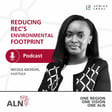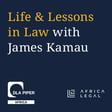Become a Creator today!Start creating today - Share your story with the world!
Start for free
00:00:00
00:00:01

Hogan Lovells General Counsel Series: Ep 1, Part 2 - 'Understanding opportunities and grabbing them'
In Part 2 of Hogan Lovells’ new podcast, The Africa GC Series, three leading GCs from some of the world’s largest corporates share their experience and insights regarding external legal advisors, ESG and the African Continental Free Trade Area (AfCFTA) Agreement.
Deepa Vallabh, a partner at international law firm Hogan Lovells, introduces the second episode, in which Hogan Lovells’ former Chair of Africa, Andrew Skipper, now founder and CEO of Polymetis Professional Solutions spoke to Samallie Kiyingi of African Export-Import Bank (Afreximbank), Vivian Osayande of Novartis, and Wellington Chimwaradze of Unilever.
All the panellists agree that it’s a balance between using in-house capabilities and looking for external advice which costs more but comes with added benefits.
Osayande says for her it’s always about asking “What is the most efficient way?” She highlights that in-house people are very internally focused, so there’s the risk of missing trends, whereas external counsel brings agility from working for different industries and can often pinpoint new opportunities – but you must know you can trust their advice.
Chimwaradze agrees with the importance of building a trusted panel you can draw on, which is what he’s done. “They (external counsel) are an extension of me,” he said.
Moving onto environmental, sustainability and governance (ESG) issues, Kiyingi notes that there are many conversations happening about ESG, but that sustainability is the key word. She highlights that for Africa sustainability may mean something different to what it does to the West, and speaks about the way Afreximbank is looking to influence this conversation.
Osayande says innovation is crucial in driving sustainability, and notes some examples of this.
Chimwaradze points out that he is proud of Unilever’s purposefulness which set the ambition of driving sustainability before it was fashionable to do so, and which sets targets to make sustainable living commonplace across the globe.
When it comes to AfCFTA, Kiyingi emphasises that it’s important to be familiar with the agreement and also its origins, reminding listeners that AfCFTA is just one aspect of the African Union’s Agenda 2063 which is the master plan for transforming Africa into the global powerhouse of the future.
“How do we build institutions to ensure this works well?” she asks. Kiyingi goes on to point out that a key factor is building awareness of what this trade agreement does, and helping business and government take advantage of that. One way of doing this is through the trade fairs Afreximbank organises.
Chimwaradze mentions tradeoffs that are inevitably required with agreements like AfCFTA, and Kiyingi highlights some ways of mitigating those.

















